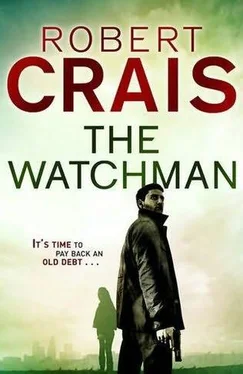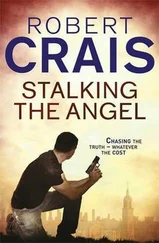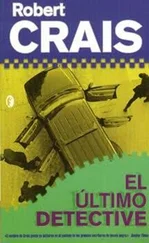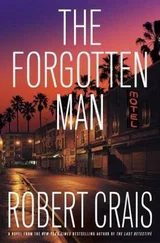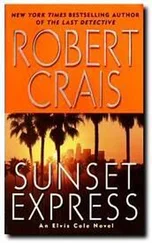Throughout the night, Pike had dozed a few minutes at a time on the couch, but had never been fully asleep. Every hour or so he moved through the house, checked the windows, and listened. Houses were living things, as were cattle and forests and ships. When all was well, the noises they made sounded right. Pike listened for rightness. He had entered the girl’s room twice and found her snoring softly both times, once on her belly, once on her side, her covers kicked into a heap. Each time, he stood quietly in the darkness, listening to her breathe, then checked the windows before moving on.
Now he stood in the living room.
At five-forty that morning, the girl staggered out of her room and into the bath without seeing him. The bathroom light came on, the door closed, she did her business, the toilet flushed.
Pike never moved.
The door opened as she turned off the light. She shuffled out of the bathroom, carrying one shoulder higher than the other, and in that moment she saw him. Her eyes were puffy slits because she was groggy with sleep.
She said, “Why are you wearing sunglasses in the dark?”
Pike said nothing.
“What are you doing?”
“Standing.”
“You’re strange.”
She shuffled back to her room. The toilet filled. The water stopped. The house was once again silent.
Pike did not move.
At two minutes after six, his new cell phone vibrated. Pike answered when he saw it was Ronnie.
“Yes.”
“The alarm at your condo went off twelve minutes ago.”
Whenever an alarm was received, the security company would first phone the subscriber to see if everything was all right. False alarms were common. Pike had arranged for his security company to call Ronnie’s number if they received an alarm. He had also told them not to notify the police.
Pike said, “What did you tell them?”
“Everything’s cool and they should reset the alarm, just like you said. You want me to roll over there?”
“No. I’ll take care of it.”
Pike thought for a moment.
“Call the security company back. Tell them if they get an alarm at the store, we want a full-on response.”
“Got it.”
Pike put away the phone, then checked the time. The alarm had probably been tripped when they breached his front door or a window. They were likely still in his home. They would just as likely be gone by the time he arrived unless their plan was to wait, but Pike was okay with it. He had to stay with the girl.
Pike thought about them being in his home. He had figured it was only a matter of time, and now it had come, and he was glad for it. They had gotten his name, found his address, and now were trying to find him. This told him much-someone who knew his name had provided it, and the only people who knew his name were the girl’s people, Jon Stone, and Bud Flynn. There was no other way, so someone was selling her out. Pike was right to cut them out of the loop.
Pike hoped they would wait for him at his home, but they would probably move on to his shop, then return to his condo again later. At some point they would learn of his association with Cole, but they would move on his gun shop first. However they handled it would tell him much about the size of their operation and their skills. It was important to know your enemy.
But, for now, the girl was sleeping. The night had passed. She was still alive. He had done his job, but still had much to do.
Pike let the girl sleep. He phoned Cole to let him know, then stood in the living room, waiting. His heart rate slowed. His breathing slowed. His body and mind were quiet. He could wait like that for days, and had, to make a perfect shot.
Elvis Cole
Another in the long line of classic Pike phone conversations. Like this. Cole, out on his deck sweating through some asanas when the phone rings. Six A. M., who else would it be? Gimps inside. Scores the call.
“Hello?”
Pike says, “Be advised. They just hit my condo.”
Click.
No whaddayadoing? No heyhowareya? No whaddayathinkaboutthat?
Classic.
Cole finished the asanas, showered, then pulled the old.38 George Feider gave him from his gun safe and made a cup of coffee. He brought the gun, coffee, and materials on George King and Alexander Meesh out to his deck. He had spent much of last night pulling things off the Internet. Cole wasn’t worried about being stormed by black-shirted hitters, so he used the gun as a paperweight to keep the papers from flying away.
It was a lovely morning, hinting at a brutally hot day.
Cole squinted into the milky haze that filled his canyon, enjoyed the coffee, and noticed a red-tailed hawk circling overhead, searching for field mice and snakes.
Cole said, “What do you think? Is today his day or not?”
A black cat sat nearby on the deck, staring down through the rail into the canyon. The cat didn’t answer, which is what you get when you talk to cats.
Cole said, “You’re just jealous you can’t fly.”
The cat blinked as if it was falling asleep, then abruptly licked its penis. Cats are amazing animals.
Cole studied the hawk. The day after Cole came home from the hospital, he went out onto his deck at dawn (just as he had every morning since) and struggled through twelve sun salutations from hatha yoga (just as he had every morning since). He had not done them well that first morning, or completely, but he did what he could, then sat on the edge of his deck to watch the hawk. The hawk returned every day, but Cole never saw it catch anything. Yet every morning it appeared again, circling, searching for something it never found. Cole admired its spirit.
Cole had more of the coffee, then reread the material he’d pulled off the Internet on George King. King was a real estate developer from Orange County who began his career by building a single-family spec house on a shoestring budget using money borrowed from his wife’s parents. It was the classic by-his-bootstraps success story: King sold that first house for a profit, then built three more, and the houses led to a couple of tiny strip malls. The strip malls led to twenty-, forty-, then one-hundred-sixty-unit apartment houses. The apartments led to a real estate concern that now developed shopping centers, residential tract housing, and high-rise commercial office space throughout California, Arizona, and Nevada. None of the articles hinted at impropriety, illegal activity, or shady business practices. Based on everything Cole read, George King was a solid citizen.
Alexander Meesh was not.
Cole had found nothing about Meesh on the Internet. The last entry in the NCIC report Pike had given him was dated six years ago, and ended with the notice that Meesh had fled the country and was currently believed to be living in Bogota, Colombia. Absent for six years, Meesh was old news.
Reading the NCIC brief was like reading the TV Guide version of a twenty-year criminal career. An expanded version including photographs, fingerprints, and even DNA could be had by special request, but the shorthand version told the tale with a chronological list of crimes, convictions, incarcerations, descriptions, associates, and warrants.
Meesh was a peach. He had been indicted on two counts of first-degree murder, seven counts of conspiracy to commit murder, and sixteen counts of racketeering, all in Colorado. Meesh, who oversaw several hijacking crews, had murdered a truck driver and his wife in Colorado Springs, Colorado. Meesh believed the driver had double-crossed him by laying off a load of flat-screen TVs to a rival hijacking crew. Attempting to recover the flat-screens, Meesh poured hot cooking grease on the driver’s wife. Not just once, but repeatedly during a twenty-four-hour torture session. Then he went to work on the driver. Witnesses to the event claimed Meesh wanted the other crews in the area to understand he owned the roads.
Читать дальше
